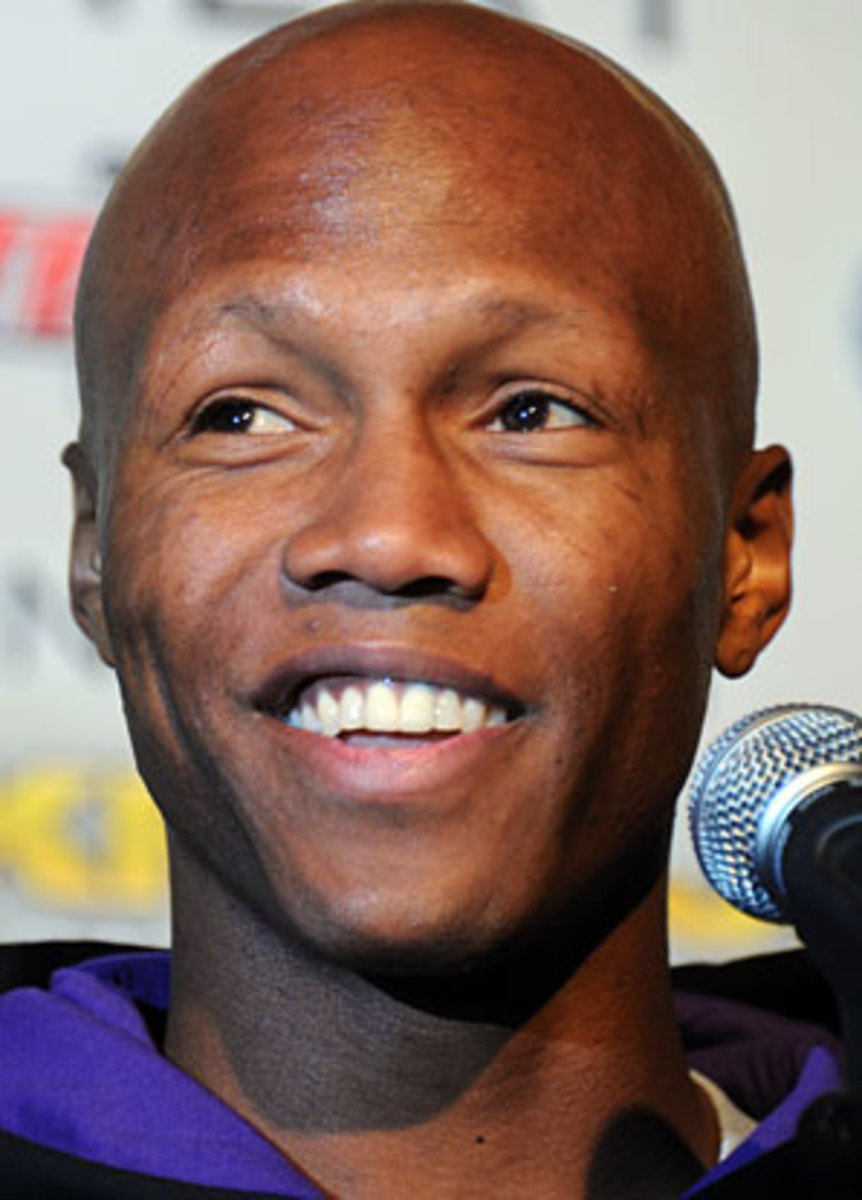Ex-champ Judah, resilient as ever, plots return to 140-pound summit


Resilient: recovering readily from illness, depression, adversity, or the like; buoyant
NEW YORK -- Zab Judah slipped slowly into a padded chair, dark sunglasses covering his eyes, iPod buds dangling from his ears. From the back of the room, a woman in a Team Judah tee chanted "Suuu-per Juuu-dah" while a bulky man with a camcorder barked "Brooklyn" over and over, like a skipping CD unable to move on.
A toothy grin quickly replaced the blank expression on Judah's face. The brash, cocky kid who won his first world title in 2000 at the tender age of 21 has matured, has found God and mellowed considerably. The swagger, however, is still very much there.
But Judah is no longer a rising star, a champion everyone is chasing. Last summer, Judah took on Amir Khan in a junior welterweight unification bout. It was an anticipated fight, with Judah, who had looked strong after dropping down from welterweight, and Khan, the breadwinner in the 140-pound division, battling for supremacy. The fight itself didn't live up to the billing: Khan dominated the first four rounds before dropping Judah with a borderline body shot that Judah couldn't recover from.
"I made a lot of mistakes," Judah admitted. "I relied on my defense too much. I wasn't the offensive Zab Judah. Zab Judah is a fighter with speed and power, domination and aggressiveness. And I didn't use any of that. I don't know why."
The loss was a setback, though by now Judah is used to them. Judah has won some big fights -- a knockout of Cory Spinks in 2005, a win over Lucas Matthysse in 2011 -- but his career has been defined by his inability to win the really big ones. High profile fights against Kostya Tszyu, Floyd Mayweather, Miguel Cotto and Josh Clottey have resulted in losses, casting Judah as a good fighter who can't get over the hump.
"Hey, I have had more better days in boxing than worse ones," Judah said. "I don't look at a loss as the end of the world. [Muhammad] Ali was the greatest. He had losses on his record. You are going to win, you are going to lose."
If Judah's career is marred by his losses, it is highlighted by his ability to bounce back. When Judah lost his junior welterweight belt to Tszyu, he regained another piece of the title two fights later. After a tough two-year stretch at welterweight that included losses to Mayweather, Cotto and Clottey, Judah rebounded by dropping back down to 140 pounds and knocking out Kaizer Mabuza for a junior welterweight title. Indeed, history has proven that Judah can be knocked down, but not out.
Once again, Judah finds himself backed against a wall. It wasn't just that he lost a fight to Khan; it was that he was completely uncompetitive in it. On Saturday night Judah (41-7) will take the first step towards regaining his status in the 140-pound division when he takes on Vernon Paris (26-0) at the Aviator Sports Complex in Brooklyn (10 p.m., NBC Sports Network). The winner will become the mandatory challenger to the winner of May's rematch between Khan and Lamont Peterson. The loser will fall even further back in the pack.
"Yeah, I think this is a must-win," Judah said. "It's a fight that is going to place Zab Judah where he is at in the boxing world today. The only place you can place me is at the top."
At 34, Judah knows the number of times he can bounce back are dwindling. But he is convinced he has enough left in the tank to make one more run.
"You look at some of the top in the pound-for-pound list and you see Bernard Hopkins, Wladimir Klitschko, Juan Manuel Marquez," Judah said. "All those guys are older than me. [Manny] Pacquiao is one year younger than me. Growing old isn't bad."
Judah understands the challenge in front of him. Pernell Whitaker, who trained Judah the last two fights, won't be in his corner on Saturday, a decision Judah says was a mutual one. Instead, Judah's uncle, James Harvey, will work the fight. Paris, 24, is unbeaten and hungry, oozing confidence. As Thursday's press conference broke up, Paris shouted in Judah's direction that "we didn't come here to lose."
"He going to try and come forward, going to try and throw punches but when he realizes he is in there with a real fighter, he's going to look for an escape route," Judah said. "I'm prepared for him to [use] dirty tactics."
Judah says he doesn't have a specific hit list if he wins. He plans on attending the Khan-Peterson fight to "let them know who is next." But it isn't about beating Khan or Peterson; it's beating anyone who stands in the way of his return to the top.
"This is an opportunity for me to get back to the next level," Judah said. "It's my chance to get to where I want to be."
